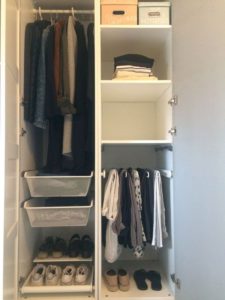
Weniger ist Mehr – nachhaltiger Konsum (Teil 1)
Die meisten Menschen können nicht behaupten, dass sie alle Kleidungsstücke auch wirklich brauchen, die in ihren Kleiderschränken hängen. Vielmals werden sie nicht öfter als einmal getragen, um anschließend aussortiert zu werden.
Konsum in der Modebranche
Die Schnelllebigkeit in der Modebranche lässt Kleidung schnell altmodisch aussehen, sodass ein abgetragener Zustand nur selten zu Stande kommt. Das Überangebot an nie endenden Neuheiten hält die wirtschaftliche Entwicklung der Konzerne auf der Erfolgsspur und sorgt dafür, dass wir uns schon nach kürzester Zeit unwohl fühlen mit dem, was gerade in unseren Schränken hängt. Mode versucht uns also zu verunsichern, damit wir schließlich weiter und mehr konsumieren. Wir werden tagtäglich manipuliert, ohne das es uns vielleicht bewusst ist. Im Vordergrund stehen bei unserer Kleidung darum nicht der Gebrauchswert und eigentliche Nutzen, sondern symbolische Werte wie Liebe, Reichtum und Macht. Hierbei handelt es sich nicht um unsere eigenen Bedürfnisse , sondern eigentlich um die der Produzenten, die uns falsche Bedürfnisse vermitteln, um höchstmögliche Profite zu erzielen.

Die Modebranche gaukelt uns vor, Kleidung mache uns reicher, schöner und erfolgreicher, obwohl wir – im Widerspruch dazu – unser Geld für sie ausgeben und es viele Menschen systematisch dazu ermutigt, sich zu verschulden. Eine Art Protestbewegung und ein Zeichen gegen den Materialismus und unseren heutigen, vom Konsum geprägtem Lebensstil, setzt der Minimalismus.
Was genau bedeutet eigentlich Minimalismus?
„Aber du besitzt doch mehr als ein paar Schuhe und ein Auto fährst du auch!“
Minimalisten fokussieren sich nicht darauf, so viele Gegenstände wie möglich zu entbehren, damit schlussendlich alles in einen Koffer passt, sondern vielmehr darauf, Raum für mehr zu schaffen: mehr Zeit, mehr Zuwendung, mehr Passion, mehr Entwicklung, mehr Zufriedenheit – und mehr Freiheit. Sich von Dingen zu trennen und loszulassen ermöglicht uns genau diesen Raum – Raum für die wirklich wichtigen Dinge im Leben, und das sind nun mal keine materiellen. Minimalismus führt zu einem Leben mit mehr Bedeutung, einem Leben umgeben von Dingen, denen du wirklichen Wert zusprichst.

Minimalisten erreichen diesen Zustand, indem sie überflüssige Gegenstände aus ihrem Leben entfernen. Behalten wird alles, was wirklich Freude bereitet oder seinen Sinn und Zweck erfüllt. Das ist natürlich von Person zu Person völlig unterschiedlich.
Es geht nicht darum, Dinge zu vermissen, die einem wichtig sind. Vielmehr geht es um die Wertschätzung der Dinge die wir besitzen. In diesem Blog erfährst Du, wie Du Deinen Kleiderschrank zu einer minimalistischen Capsule Wardrobe umwandeln kannst. Du könntest Dich auf die Lieblingsstücke reduzieren, die Du vielseitig anwenden kannst. Wie wäre es mit unserer Leggings Shakti und unserem Bustier Sundari, Du kannst die Stücke zu Deiner Yoga-Einheit, Deiner Meditation oder auch zum Entspannen und als Streetwear tragen.
Minimalismus & nachhaltiger Konsum
Ob ein minimalistischer Kleiderschrank bzw. ein minimalistisches Leben für dich infrage kommt, weiß ich nicht. Ebenso wenig kann ich dir sagen, ob es dich glücklich machen würde. Du kannst dich von Dingen trennen und todunglücklich sein, denn loslassen macht nicht automatisch sofort glücklich. Aber es wird Dir dabei helfen herauszufinden, was Dich glücklich macht.
Less is more – an incentive for more sustainable consumption
Most people can’t really say that they need all of their clothes, stored in their wardrobes. Worn once or twice and sorted out afterwards.
Consumption in fashion
The fast pace environment in the fashion industry leads to a faster impression of the feeling that our clothes are looking quite old fashioned. A well-worn condition is a rare case. Oversupply of never-ending novelties is holding up the economic development in the fast lane. As a result, we are feeling uncomfortable with what we’ve got in our wardrobes. Fashion tries to insecure us so that we are consuming more and more. We are getting manipulated every day without even recognising it. A direct benefit of fashion is therefore not the object of utility. The real benefit is filled up with symbolic values like love, wealth and power, which are not our own needs, but the manufacturers. They convey us with a false sense of need to increase profits. The fashion industry is manipulating us, saying clothes will make you richer, more beautiful and successful, but in contradiction to that we are spending more and more money and finally getting into debt.
A kind of anti-movement and a sign against the materialism in our consumption society is minimalism.
What is minimalism?
“But you own more than a pair of shoes and you’re driving a car too.” Minimalism is not about focussing on having as little as possible, to get everything to fit into a suitcase. It is more about making space: more time, contribution, passion, development, satisfaction – and more freedom. Leaving things behind and letting go of them gives us space – space for the important things and these are not materialistic.
Minimalism leads to a more meaningful life, a life surrounded by important things. Minimalists that reach this state by removing unnecessary objects out of their life. They keep everything that brings happiness or has a special purpose. Certainly, this really depends on the person and can seem completely different. It’s not about missing things which are important to ourselves. Rather it is about the appreciation of our belongings.
I can’t say if a minimalistic wardrobe is for you. Also, I can’t tell, if it would make you happier. Letting go can make you as miserable as sin, but in the end, you’ll find out what makes you happy. What is minimalism?
“But you own more than a pair of shoes and you’re driving a car too.” Minimalism is not about focussing on having as little as possible, to get everything to fit into a suitcase. It is more about making space: more time, contribution, passion, development, satisfaction – and more freedom. Leaving things behind and letting go of them gives us space – space for the important things and these are not materialistic.
Minimalism leads to a more meaningful life, a life surrounded by important things. Minimalists that reach this state by removing unnecessary objects out of their life. They keep everything that brings happiness or has a special purpose. Certainly, this really depends on the person and can seem completely different. It’s not about missing things which are important to ourselves. Rather it is about the appreciation of our belongings.
I can’t say if a minimalistic wardrobe is for you. Also, I can’t tell, if it would make you happier. Letting go can make you as miserable as sin, but in the end, you’ll find out what makes you happy.
Freedom
A stuffed wardrobe but still no idea what to wear in the morning?
Imagine you loved all of your clothes, that you appreciated every single one. You don’t have to spend much time getting dressed every day to find out that you don’t have the right things. Maybe you feel similar sometimes and you are up for a change.
You can achieve this by having a system to keep everything well organised:
Clear up your wardrobe and sort your clothes by categories: dresses, skirts, shirts, trousers…
Decide properly which colours and cuts really suit you – this is an individual decision, but a little orientation and advice can help and save you money.
What do you feel comfortable in?
What are you wearing gladly and often?
Does my wardrobe fit into my everyday life? – Decide properly which clothes you need for every occasion
Does this piece make you feel something positive or negative?
It might be preferable to let go of the items that don’t suit you, clothes that are rarely or unlikely worn, the ones that cause negative feelings. Keep what makes you happy!
If you are not sure about letting go of some things, pack them into a box and store it somewhere out of sight. A special piece is on your mind again and again? It seems like you have to keep it!

Over a long period of time, I had problems letting go off clothes that have a more emotional value to me. Holiday souvenirs, presents or heirlooms for example. To make yourself clear that the memory you connect with the garment is not in the garment itself, can be helpful. Memories are deeply rooted in ourselves and will stay there, I promise.
And what is happening with the decluttered clothes?
The best thing is to sell, exchange or donate them!
Letting go can be hard sometimes, cause who knows when the next season you can wear your glitter pants and plateau shoes comes? Maybe these tight pants will fit next summer again and maybe I am going to wear my silk kaftan during summer vacation. Probably that seems familiar to you. Give yourself enough time letting go, keep an eye on your intuition and look forward to a life with more space and meaning.
Reaching the awareness to realise what we really need instead of shopping the latest trend, needs time. In case you’re looking for something new, think about different cuts, patterns and materials you like before you buy anything new. With adding a selection of extravagant second-hand pieces or fair fashion founds, you’re coming closer to an individual and minimalistic wardrobe.







